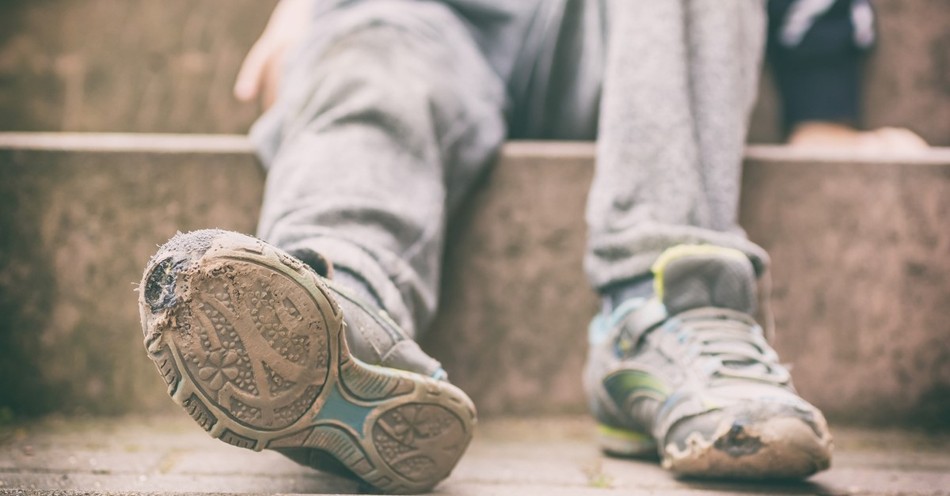I was raised American poor. I call it American poor because the brand of poverty I lived through pales in comparison to some of the 3rd world poverty I’ve seen firsthand in India, Colombia and El Salvador. But, by United States standards, my family was poor.
Although we qualified for food stamps my mom refused to take advantage of them. She felt in some weird way that this would be admitting defeat and stealing from the government. Although she should have gotten alimony from at least one of the four marriages she had experienced in her relatively young life, she didn’t get any.
Our family experience was filled with deadbeat dads (whom we never saw), hard work and pressing bills. To add insult to a high possibility of injury my mom, brother and I lived in one of the highest crime rate areas of our city.
Mom scraped and scrapped to put food on the table, clothes on our backs and some shred of dignity for our souls. She was determined to raise us as well as she possibly could. But sometimes the pressure was too overwhelming for her.
She would often cry herself to sleep at night. My brother and I could hear her through the paper thin walls of our tiny apartment. Mom told us many times that she was worried that we would turn out to be just like her. To be honest I didn’t know what she meant when she said that. To me, my mom was everything. She was strong, hard-working and surprisingly generous.
But she felt like a loser. She felt like a loser because she couldn’t keep a relationship. She felt like a loser because she couldn’t get ahead of the relentless bills. She felt like a loser because of the sins she had committed. And every month when bills came due those feelings were magnified.
As a kid I was a collector of pennies. In sidewalk cracks and underneath couch cushions I looked for those shiny copper coins everywhere I went. By the time I was eight I had amassed a fortune ($50 worth!) I’ll never forget the look of shame my mom had when she asked to borrow the money from me so that she could buy groceries for us that week. I agreed and she promised to pay me back when she could.
Mom worked long hours at her job and did what it took to make sure her boys had enough to survive. But when she felt the pressure of unpaid bills and an inability to change the situation she would sometimes crack. I remember once she took out her anger on Paul, one of the guys she had married. After all he had left us high and dry with bills to pay. Then one day out of the blue he showed up in a new car in front of our place. I’ll never forget when she took a baseball bat to his car and then turned it on him. By the time he drove off the car was trashed and he was covered in blood. We never saw him again. The only thing he left behind were his unpaid bills.
I know American poverty. I was raised in it and reared by it. To me poverty is not a theoretical subject for the seminary classroom, but the shaper of many of my childhood memories. Yes, we had people that helped us along the way, including my grandparents. But mom paid back every loan she ever got from them and the stress of it all took a huge toll on her. I think that’s why one of the only luxuries she allowed herself was two packs of smokes per day.
But in the midst of all this Jesus came walking in and changed everything. Through a variety of crazy circumstances my entire family ended up coming to Christ over a few short years.
My toughest uncle was reached with the good news first and the rest began to fall like dominos. Uncles, aunts, cousins eventually all put their faith in Jesus. For the first time real and lasting hope entered my family and I was a firsthand witness to it all (that’s a big part of why I’m so passionate about the power of the gospel to change lives!)
When my brother and I trusted in Jesus we began to share this message of hope with my mom. For years she resisted. She thought she was too bad for God to save. She especially felt guilty because she had lived a life of hard partying. I was the result of one of those parties. When she found out that the man she met got her pregnant she drove from Denver to Boston under the pretext of visiting family. Her real intention was to have an illegal abortion (this was before Roe VS Wade.)
But my grandparents found out, got ahold of her talked her into having “that baby” (aka “me!”) That’s probably why she always looked at me with a look of guilt and maybe part of the reason she cried herself to sleep at night. She had almost taken my life in her womb and, as a result, felt unforgivable.
But my brother and I kept sharing with her the message of hope that we now had in our hearts. When I was fifteen years old she finally relented right there at the kitchen table while smoking a pack of Benson and Hedges Gold 100′s cigarettes. I had the privilege of leading my mom to Jesus in that smoke filled kitchen.
Over time my mom’s tears were replaced with a new and profound sense of joy. Jesus gave her (and us) hope both in this life and the next. It was this hope that made us feel rich for the first time. We were still poor financially but we felt like millionaires in the deepest part of our souls.
And now we had Somebody to talk to who would, not only listen, but could do something about our situation. My mom’s sense of hopelessness was replaced by a sense of anticipation and deep joy.
That’s why I don’t pay much attention to Christian theories of social justice that minimize the gospel message in the whole process of ministering to the poor. I would guess that many experts who’ve been perpetuating these theories have never been poor themselves. Some even try to make themselves poor (move to a poor part of the city, live on next to nothing, etc) so they can relate…but it doesn’t work that way.
You see poverty is not the absence of money. It’s the absence of hope. Self-induced poverty always has a way out. It can always reverse the situation when the experiment gets boring. Real poverty can’t.
Jesus brings the audacity of real and lasting hope into a hopeless world. That’s why providing food, clothes, job opportunities and money are not enough when it comes to social justice. These things may be a beginning but they are far from the end.
Don’t get me wrong, growing up I was deeply grateful for every helping hand our family received. I was personally blessed by adults outside our family who helped me make it through my poor upbringing. From taking me out to eat to giving me clothes to helping send me to camp every gift I received from Christians I knew growing up was appreciated. But it was the message of Jesus that truly gave me, my brother and, eventually, my mom a hope that we couldn’t shake.
Feed the hungry, clothe the naked and give jobs to the poor. But please don’t leave Jesus out of the social justice equation. Provide them bread for their bodies and then give them The Bread of Life for their souls. Provide them water to quench their physical thirst and then give them The Living Water for their spiritual thirst. Build them a house here on earth and then build them one in heaven as well.
Anything short of that is a lesser brand of social justice.
Article first published February 26, 2014)
Greg Stier is the Founder and president of Dare 2 Share Ministries International. He has impacted the lives of tens of thousands of Christian teenagers through Dare 2 Share events, motivating and mobilizing them to reach their generation for Christ. He is the author of fourteen books and numerous resources, including Dare 2 Share: A Field Guide for Sharing Your Faith and Firing Jesus. For more information on Dare 2 Share and their upcoming conference tour and training resources, please visit dare2share.org.
Photo Credit: © Getty Images/Ralf Geithe








